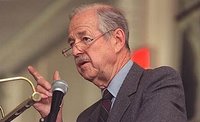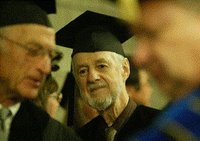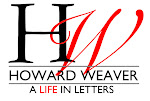Tim Porter has a posting over at First Draft describing what he sees as a significant shift in thinking about change at newspapers. He focuses chiefly on a recent column by Chris Peck at the Commercial Appeal, which was I suspect partly the product of some time a bunch of us spent at Poynter on the subject earlier last week.
Short version of Tim's conclusion: "The patient has swallowed the bitter pill."
After two days of talking about the future of news with stockbrokers, publishers, academics and others, Gregory Favre asked all of us to spend an hour writing something about our vision of the future, along with a short-term and long-term action item each of us could undertake to accomplish this. These are to be published on the Poynter site sometime soon.
I know I had a bit of a headstart since this is something I think and talk about all the time with you folks. You will likely recognize much of what I had to say:
Future of News
Poynter Institute 23 May 2006
A former newspaper editor named Mark Twain once famously observed that he wasn’t worried about his ability to find work because, “I figure even the people in the north of hell will be curious about what the people in South Hell have been up to.”
On that essential truth rests all my thinking about “the future of news.” Tomorrow’s appetite for real news and information will not be less than today’s. People’s curiosity will not diminish. Those who have reliable and timely information will continue to be advantaged over those who do not. And that means people who can supply such information will remain essential.
Yes, information is becoming freely and ubiquitously available, delivered around the clock and in many formats. Yet people don’t need more data in their lives. A recent book called “Data Smog” makes the point that too much information – or bad quality information – can, like polluted air, become toxic. People will always need help sorting, verifying and organizing the bewildering range of data flowing all around them, and so organizations that can do that will, like Mark Twain, always have job security.
Fortunately, those are skills that newspapers and newspaper journalists have honed carefully over many decades. While we’ve often been hidebound and stubborn about our delivery mechanisms and our relationship with readers, our much-vaunted “core competencies” are right at the center of filling this need.
The 21st century news company will have to be able to make a pitch to audiences something like this:Yes, we know you’re awash in data and information. You wake up to NPR, listen to talk radio on your commute, surf the web when you should be working and see CNN in the lunchroom. You’ve been titillated by blogs and email alerts all day; friends and coworkers have sent you IMs about the latest item to tickle their fancy. You’ve got books and podcasts cued oup on your iPod. So what can we possibly do for you?How about this: I’ll ask a hundred of the smartest people I know to spend all day sorting through that information, figuring out which of the blog items you saw is accurate enough to deserve your attention, comparing what the Secretary of Defense said on TV with what he told you last month, figuring what’s likely to happen tomorrow on that big story that dominated CNN. They’ll organize it in concise and manageable dimensions, collect it all in one spot and deliver it to your doorstep first thing in the morning to help you organize and orient your coming day.
In the meantime, we’ll use all those other channels as well to keep you posted on what we learn about the latest developments, and to deliver the information – chiefly local – that we alone have bothered to check out and discover.
In short, we’ll promise to make their lives better – to give them advantages over less well informed or less carefully briefed colleagues and competitors. We can help them narrow their choices for entertainment or understand why the local coach was so stupid. We can share an emotional connection with neighbors, or expose a corrupt contract at city hall.
That’s a hell of a “value proposition,” a promise to deliver real benefits in exchange for their most precious possession: a piece of their busy day. In the coming “attention economy,” where the only thing in short supply is time, that’s the only way to be valuable to people.
I haven’t spent time talking about the economics of the industry here partly because it’s not my expertise, but also because I have considerable confidence in the resilience of our basic business model: selling audiences to advertisers. If we assemble quality audiences and learn to deliver them (or partner with people who can), there will be willing buyers for that service. I can’t promise a smooth transition from our quasi-monopoly position to this new reality, but my faith in it is undiminished. (Basically, I trust that smart colleagues on the other side of the house will work as hard and intelligently on the business model as we are on content.)
In the short run, I can help secure this future for our industry by helping people get over their fear and frustration and embrace the opportunities. Al Gore says the biggest challenge in getting people to deal with climate change is that they tend to go straight from denial to despair when they contemplate the future. That seems true for people in the news business, as well. Fortunately, that cloud of gloom is easily dissipated by clear thinking and refocused perspective.
In my view, the long term is less frightening and less perplexing than this interim, transition period in which we must continue our traditional operations while embracing change. (Insert metaphor here about changing the oil in your car while driving down the freeway ...) But perhaps our best service in this will be to help our colleagues recognize that these aren’t really two separate tasks so much as a migration from one form of storytelling to another – a relocation, perhaps, from the north of Hell to the south, or even to happier climes.– Howard Weaver



